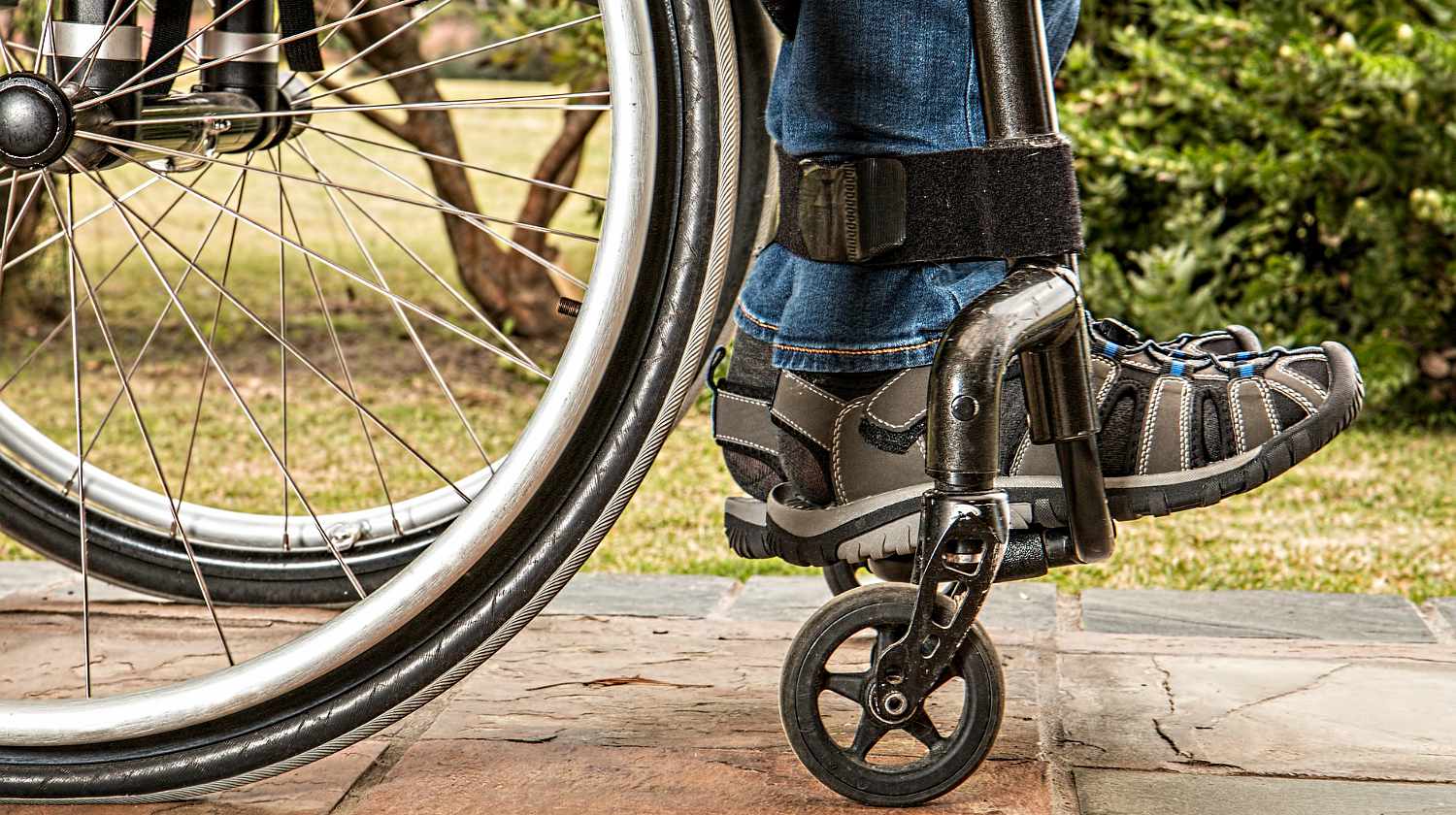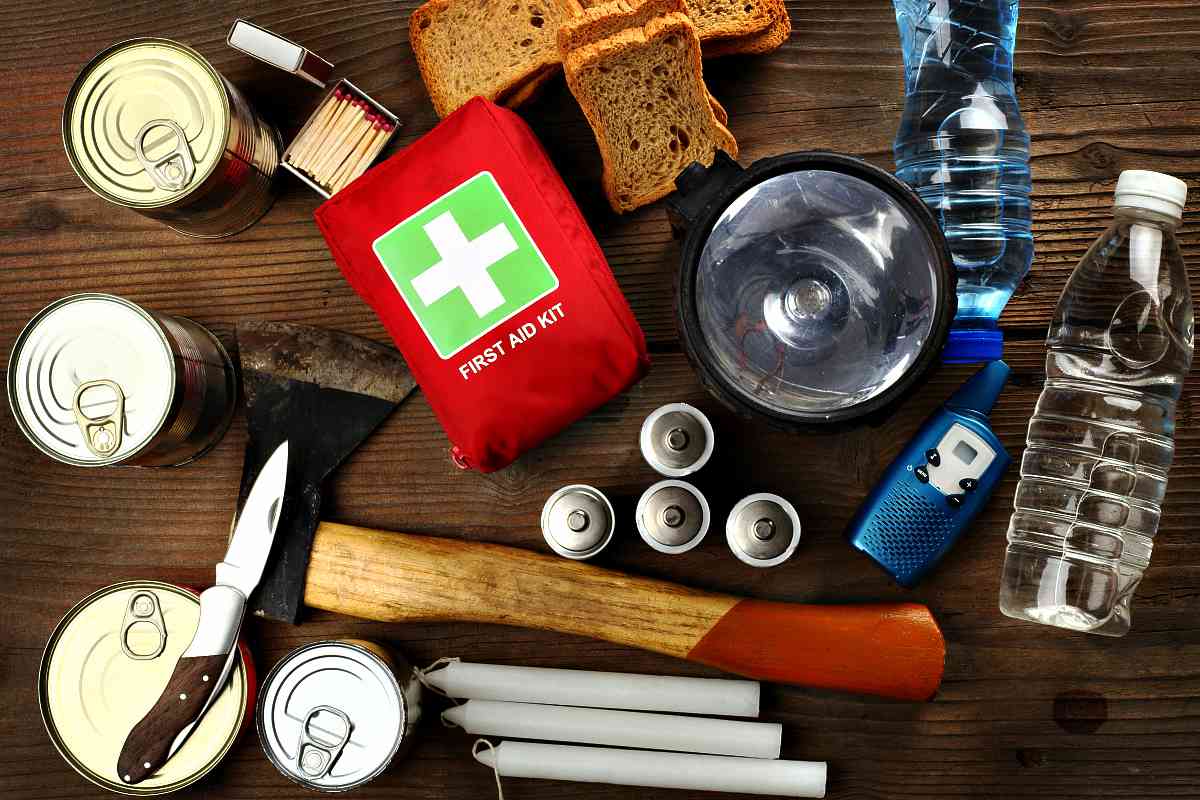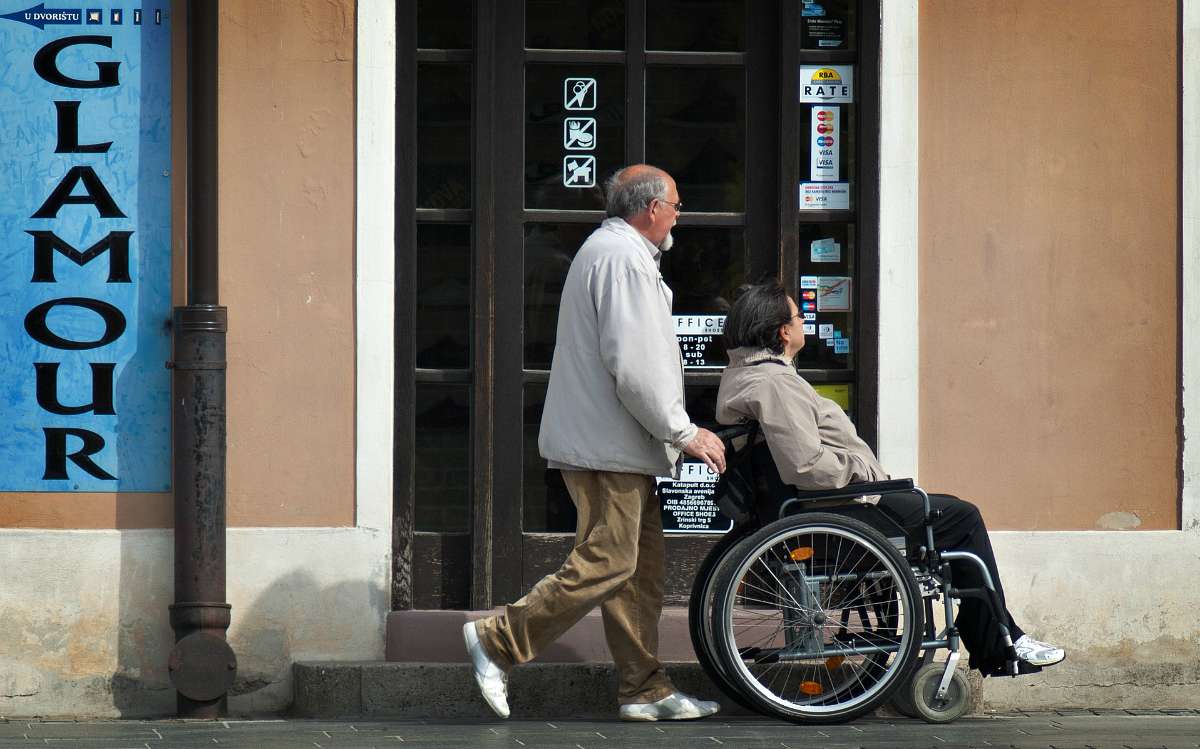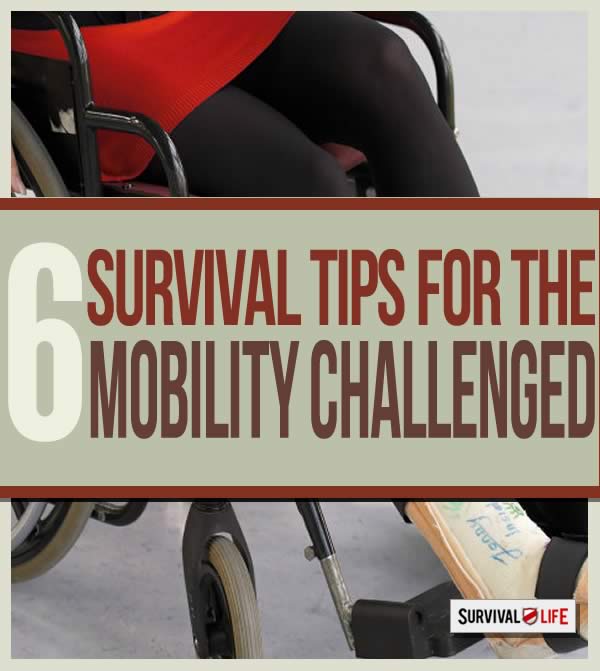Personal Safety
6 Prepping Tips For The Mobility Challenged

The mobility challenged can also prep for survival. Here are some useful tips from Gaye Levy for handicapped people!
RELATED: Everyday Uses For Your Emergency Survival Kit
How to Prep Guide for the Mobility Challenged
Survival Tips for a Person with a Disability
Those who are mobility challenged are often overlooked in discussions of prepping and survival. But if we are to be true survivalists, we have to focus on every scenario that could possibly take place.
Whether you’re mobility challenged because of a temporary injury or permanent disability, you need to know how to handle a disaster situation just like anyone else would.
Contributor Gaye Levy from Backdoor Survival has some tips for preparing with a physical injury or disability. Read on for some great prepping tips for the mobility challenged.
Mobility Challenged Meaning: A person with difficulties in moving around due to an injury, disability, or sickness.
Being Unable to Move During Disasters
If you have ever had an injury that limited your mobility, you will understand why knowing how to deal with mobility challenges following a disaster is important. A sprained ankle, a broken leg, a fractured arm; all of these can severely restrict your ability to dig your way out of or evacuate in the aftermath of a disaster.
These temporary disabilities are annoying and inconvenient at best. Now put yourself in the shoes of an individual with a permanent disability; someone who requires a walker, a wheelchair, crutches, or a scooter to move around.
Clearly, getting out of harm’s way will be slow as ordinary objects such as furniture, stairs, curbs, and doorways become obstacles or even barriers to escape for a physically challenged person. Add to this the challenge of moving about during chaos and panic and you can understand why planning advanced survival tactics is important.
Today I share six preparedness tips for the mobility challenged. But please take note: These tips are for everyone because when and if the time comes, it may be you with the challenge and not your neighbor, your spouse or your friend.
Having an awareness of the obstacles that a person with mobility issues faces will make you a better prepper.
The Basics of Prepping Apply to the Mobility Challenged
Regardless of any physical challenges, the basics of prepping still apply.
Accumulate food, water, first aid, self-defense, and the other items to get by under dire conditions. Have the gear you will need to stay warm and the means to cook your food when the grid is down.
Practice your homesteading skills and develop a community of like-minded people to watch your back as you will watch theirs.
These are basic tenets of preparedness and things you will do because these are the things that all preppers do.
- SERPA Auto Lock release
- Passive retention detent adjustment screw
- Speed-cut design for rapid draw, target acquisition and re-holster
Six Preparedness Tips for the Mobility Challenged
1. Store Your Stuff
Store emergency supplies in a pack or backpack that can be attached to crutches, a walker, a wheelchair, or a scooter. A first aid kit should also be included in your pack of supplies.
Store the needed mobility aids (canes, crutches, walkers, wheelchairs) close by in a consistent, convenient, and secured location. If possible, keep extra aids in several locations.
Keep specialized items ready, including extra wheelchair batteries, oxygen, catheters, medication, prescriptions, food for service animals, and any other items you might need.
2. Put Together a Specialized Emergency Supply Kit

Keep a pair of heavy gloves in your supply kit to use while wheeling or making way over glass or debris.
If you use a motorized wheelchair or scooter, consider having an extra battery available. A car battery can be substituted for a wheelchair battery, but this type of battery will not last as long as a wheelchair’s deep-cycle battery.
Check with your wheelchair or scooter vendor to see if you will be able to charge batteries by either connecting jumper cables to a vehicle battery or by connecting batteries to a specific type of converter that plugs into your vehicle’s cigarette lighter in the event of loss of electricity. And if so, get some of these cables to keep in your emergency pack.
If your chair does not have puncture-proof tires, keep a patch kit or can of “seal-in-air product” to repair flat tires, or keep an extra supply of inner tubes.
If possible, store a lightweight manual wheelchair.
No products found.
3. Know your Surroundings
Arrange and secure furniture and other items in a manner that will provide a clear path of travel and barrier-free passages.
If you spend time above the first floor of a building with an elevator, plan and practice using alternative methods of evacuation.
If you cannot use stairs, determine in advance which physical carrying techniques will work for you. Understand that there will be instances where wheelchair users will have to leave their chairs behind in order to safely evacuate a structure.
Sometimes transporting someone downstairs is not a practical solution unless there are at least two or more strong people to control the chair. Therefore, it is very important to articulate the safest mode of transport if you will need to be carried. As an example, for some, the traditional “fire fighter’s carry” may be hazardous due to respiratory weakness.
Plan at least two evacuation routes; you never know when your primary means to exit will be blocked or inaccessible.
- The First Alert Home1 Fire Extinguisher is multi-purpose and is designed to fight common household...
- The extinguisher is lightweight and easy to use.
- Durable all-metal construction with a commercial-grade metal valve and trigger. UL rated 1-A:10-B:C.
4. Communication Skills are Important
Since there are many physically challenged types of people, some individuals do not know how to assist them with their needs. That’s why you need to express your needs clearly.
Practice giving clear, concise instructions regarding how to move you. Take charge and quickly explain to people how best to assist you. Determine in advance how much detail will be needed and drill your “speech” with a trusted friend that will give you some feedback.
You know your abilities and limitations and the best way that someone can assist you or ways in which you can assist them. Again, practice giving these instructions clearly and quickly, not in four paragraphs but a few quick phrases, using the least amount of words possible.
- Up to 128 memory channels;dual band handheld radio help your team avoid busy channels;dual band...
- Compatible with other band radios after setting them on the same frequency and code
- High power design provide strong penetration; you can connect repeaters more easily to expand the...
RELATED: Rule Of Threes: The Basic Guide To Survival
5. Community

Create a network of neighbors, relatives, friends, and coworkers to aid you in an emergency. Discuss your needs and make sure everyone knows how to operate your equipment.
Discuss your needs with your employer.
If you live in an apartment building, ask the management to mark accessible exits clearly and to make arrangements to help you leave the building during a disaster. The more people who know where you are and the need for assistance the better.
- 2nd generation system built on award winning Beam Smart Presence technology
- Have a "physical" presence anywhere, explore places remotely using the Beam's predictive navigation...
- Innovative design includes a driving assist onto its charging dock (additional docks may be...
6. Other Important Items
Be sure to make provisions for medications that require refrigeration.
Keep a list of the type and model numbers of the medical devices you require.
Wear medical alert tags or bracelets to identify any disabilities that may not be visually obvious to a stranger.
Just like any other survival skill, it is important to practice your emergency plan through regular drills. Imagine the worst and practice for that.
The Mobility Challenged Are Not Helpless
Let me be clear on one very important point.
While mobility challenges are real, the mobility challenged are not helpless. If they are preppers, they garden, tend farm animals, preserve food, practice self-defense, teach, sew, entertain, and embrace self-sufficiency with gusto.
Whereas in an emergency, the mobility challenged may need some extra assistance, at the end of the day it is the grey matter between their ears that counts. The ability to think, reason, and take appropriate action is a key component to being a prepper.
Do not lose sight of that when working with your mobility challenged neighbor and comrade as you pursue your preparedness journey.
The Final Word
Mobility challenges is not an area where I have first-hand experience. Sure, I nursed family members who had temporary mobility challenges following an operation but I never had to deal with mobility challenges during an emergency.
Watch this video from FullSpectrumSurvival about mobility and being prepared when possible:
That said, as part of my interaction with Backdoor Survival readers and during my own research, I have come to realize that certain, mobility-related strategies could become important when we least expect it.
Fortunately, also while researching this article, I found that there are some really good resources available from government agencies, senior centers and just plain folks that are willing to help formulate preparedness strategies for people with mobility challenges.
One of the better resources I found was the free booklet Emergency Evacuation Preparedness by the Center for Disability Issues and the Health Professions. You can download a copy by clicking on the link and I encourage you to do so.
The life that gets saved just might be your own.
Enjoy your next adventure through common sense and thoughtful preparation!
Gaye
How else can mobility challenged individuals prepare for emergency situations? Sound off in the comments section below!
UP NEXT:
- Prepping Tips | How to Live a “Strategic Life”
- Prepping Tips That Nobody Talks About
- 5 Tips for Beginning Preppers

Editor’s Note: This post was originally published on January 15, 2015, and has been updated for quality and relevancy.
Last update on 2024-04-24 / Affiliate links / Images from Amazon Product Advertising API
-

 Do It Yourself7 months ago
Do It Yourself7 months agoParacord Projects | 36 Cool Paracord Ideas For Your Paracord Survival Projects
-

 Do It Yourself9 months ago
Do It Yourself9 months agoHow To Make Paracord Survival Bracelets | DIY Survival Prepping
-

 Do It Yourself9 months ago
Do It Yourself9 months ago21 Home Remedies For Toothache Pain Relief
-

 Do It Yourself10 months ago
Do It Yourself10 months agoSurvival DIY: How To Melt Aluminum Cans For Casting
-

 Exports8 months ago
Exports8 months agoAre Switchblades Legal? Knife Laws By State


Cindy
January 17, 2015 at 12:27 PM
Having grown up with a best friend who was wheel chair bound I have run into many barriers. Being the stubborn sort I found ways around them. Often it was the need for improvised ramps. Two planks often worked. The person in the chair can also be the answer. Are they afraid of being tipped back to “jump” a curb? Can they transfer to a car seat or a chair? Working in tandem most challenges can be overcome.
CELESTI ARCANA
January 19, 2015 at 4:12 PM
would you be so kind as to donate a survival light to a disabled homeless disabled Veteran
Mike
February 1, 2015 at 6:55 PM
As a disabled vet. Maybe I can offer some assistance in this area ? I live in the desert southwest.
Ralston Heath
January 25, 2017 at 8:26 AM
My wife has MS, and so we are not the bug out type of people. We are the bug in type of people. We have the get home bag in the car and are prepared to live out of the car for a few day if needed. However, most of our plans involve just bugging in. It would have to be a giant natural disaster, or a man made disaster for us to leave. And if we did leave it would only be short term. So we primarily practice “homesteading” or self reliance, so we can survive for a while without all the niceties of the 21st century. (I do think my wife would go through cell phone withdrawals if we went went too long without electricity ;-)) Sure we live in a small town so there is some urbanish things to deal with. The advantage is that the “wilderness” is only blocks away so when the gas runs out I could still put squirrel and rabbit on the table.
Vernon Weiss
February 19, 2018 at 6:27 PM
Thank you for the excellent article! Many people are not in the position to throw on a 60 pound pack and hike 20 miles. An additional idea for people in poor health or that have difficulty carrying a heavy pack is: Buy a golf bag cart at a yard sale, or new if you have the money. The larger wider wheel you can buy the better. Strap your pack, sleeping pad and bag etc. to it. My wife has one in our closet that folds partially with everything strapped on it. Obviously deep snow, debris etc. can cause problems but it is far easier for her to move around.